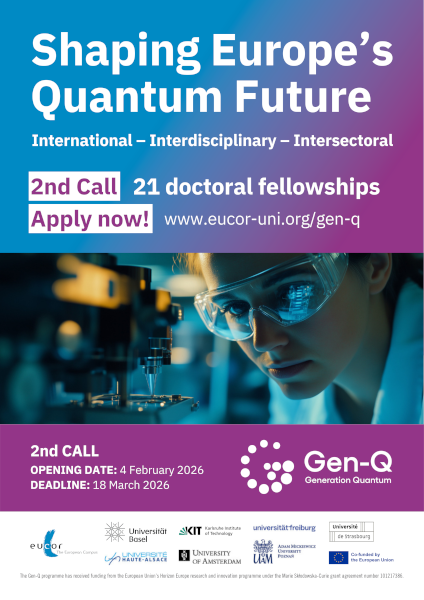Nuclear qudits in single molecular magnets manipulated with STM
-
Stellenart:
PhD Thesis
-
Institut:
PHI
- Kontaktperson:
 Nuclear spins are promising qubits or qudits (quantum systems with more than two quantum states) for quantum information processing due to their reduced susceptibility to environmental disturbances. Quantum computation with single spins, however, requires conflicting conditions, i.e., the quantum spin should be isolated from the bath to ensure long lifetimes and coherence times, but it should also be writable and readable by external stimuli.
Nuclear spins are promising qubits or qudits (quantum systems with more than two quantum states) for quantum information processing due to their reduced susceptibility to environmental disturbances. Quantum computation with single spins, however, requires conflicting conditions, i.e., the quantum spin should be isolated from the bath to ensure long lifetimes and coherence times, but it should also be writable and readable by external stimuli.
A successful concept for solving this dilemma is the use of the so-called spin cascade in single molecular magnets (SMMs), in which the qudit is realized by the nuclear spin I of a rare-earth ion. The coupling to the outer world is mediated by the hyperfine interaction to the electronic total angular momentum J of the rare earth ion, which in turn is exchanged coupled to a single electron spin S on the organic ligands of the molecule.
This unpaired electron undergoes Kondo screening, when the molecule is placed on a conductive surface. In this project, we aim to use the spin cascade of radical SMMs to read and manipulate the nuclear qudit via the Kondo screening cloud. State-of-the-art STMs operating at 25mK will be used to address single SMMs. With this approach, nuclear lifetimes of the order of hours can be realized. Hand in hand with the experimental progress, modeling of the Hamiltonian is performed within the QuTiP quantum toolbox to closely match the experimental observation and theory.
Recommended applicant’s profile
The candidate should be firm in:
• solid state physics
• quantum mechanics
Experience in the following techniques is desirable:
• scanning tunneling microscopy
• ultra-high vacuum technology
• cryogenics
• magnetic resonance techniques
• Python programming
The Gen-Q programme has received funding from the European Union’s Horizon Europe research and innovation programme under the Marie Skłodowska-Curie grant agreement number 101217386.


